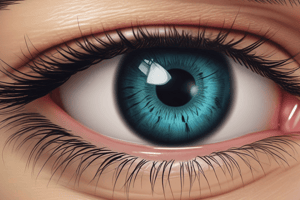Podcast
Questions and Answers
What is the primary advantage of soft contact lenses over rigid gas permeable lenses?
What is the primary advantage of soft contact lenses over rigid gas permeable lenses?
- Soft lenses allow for easier adjustment and comfort (correct)
- Soft lenses are more durable and long-lasting
- Soft lenses provide crisper vision
- Soft lenses are less expensive than RGP lenses
What is the key difference between daily disposable and monthly contact lenses?
What is the key difference between daily disposable and monthly contact lenses?
- Daily disposables require cleaning, while monthly lenses do not need maintenance
- Monthly lenses are disposable after one use, while daily disposables last for a month
- Monthly lenses offer more convenience than daily disposables
- Daily disposables are discarded daily, while monthly lenses are replaced monthly (correct)
Why is it important to change the contact lens case and solution regularly?
Why is it important to change the contact lens case and solution regularly?
- To prevent bacterial contamination and eye infections (correct)
- To save money on buying new cases and solutions
- To improve the comfort of wearing the contact lenses
- To make the contact lenses last longer
What are common signs of contact lens-related problems?
What are common signs of contact lens-related problems?
What do colored contact lenses primarily alter?
What do colored contact lenses primarily alter?
Why is it crucial to clean contact lenses with contact lens solution instead of water?
Why is it crucial to clean contact lenses with contact lens solution instead of water?
Why is it recommended to wash hands thoroughly before handling contact lenses?
Why is it recommended to wash hands thoroughly before handling contact lenses?
Which type of contact lenses eliminates the need for cleaning and storage?
Which type of contact lenses eliminates the need for cleaning and storage?
How should one remove contact lenses properly?
How should one remove contact lenses properly?
What is the proper course of action if you experience symptoms like redness and blurred vision while wearing contact lenses?
What is the proper course of action if you experience symptoms like redness and blurred vision while wearing contact lenses?
Flashcards are hidden until you start studying
Study Notes
Contact Lenses: A Comprehensive Guide
Contact lenses have transformed the way we wear corrective eyewear, offering a convenient and discreet vision solution. This guide aims to provide a well-rounded overview of various aspects of contact lenses, including comparisons, complications, care, and usage.
Daily Disposable vs. Monthly Contact Lenses
Daily disposables are single-use contacts that are discarded daily, while monthly lenses are designed to be worn for one month before being replaced. Daily disposables offer convenience, as they eliminate the need for cleaning and storage, and reduce the risk of infection. Monthly lenses are more cost-effective, as they have a longer lifespan, but require diligent care and cleaning to maintain eye health.
Signs of Contact Lens Problems
Contact lens-related problems often present with symptoms such as redness, pain, itching, blurred vision, and increased light sensitivity. These signs may indicate a lack of oxygen to the cornea, infection, or a reaction to the contact lens material. In such cases, it is crucial to remove the contact lenses and seek professional help.
Proper Contact Lens Care
Contact lenses require proper care to maintain eye health and minimize the risk of complications. Common practices include:
- Cleaning: Lenses should be cleaned with contact lens solution, not water, to prevent contamination and infection.
- Storage: Follow the manufacturer's instructions for contact lens storage, ensuring that the case and solution are changed regularly.
- Handling: Wash your hands thoroughly before handling contact lenses to avoid introducing bacteria to the eyes.
- Solution: Use the appropriate contact lens solution recommended by your eye care professional.
Types of Contact Lenses
Contact lenses are available in various types, which include:
- Soft lenses: Made from soft, hydrophilic materials that conform to the shape of the eye, providing comfort and ease of wear.
- Rigid Gas Permeable (RGP) lenses: Made from rigid materials that allow oxygen to reach the cornea. They offer crisper vision than soft lenses, but they may take longer to adjust to.
- Colored lenses: Offer a change in eye color by altering the appearance of the iris. These lenses are available in prescription and non-prescription versions.
How to Insert and Remove Contact Lenses
Inserting and removing contact lenses may seem daunting at first, but with a little practice, it becomes an easy task. Here are some tips:
- Inserting: Start by holding the contact lens between your thumb and index finger, then gently lifting the upper eyelid and placing the lens on the eye.
- Removing: Gently lift the lower eyelid with one finger while simultaneously pulling the contact lens down with the other finger.
Remember to consult your eye care professional for personalized advice and guidance when choosing contact lenses or for more detailed information on proper lens care.
Studying That Suits You
Use AI to generate personalized quizzes and flashcards to suit your learning preferences.



